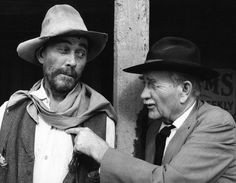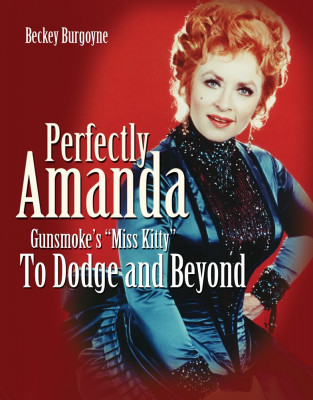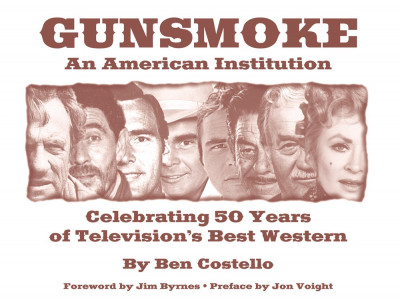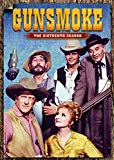| Reviews & Columns |
|
Reviews DVD TV on DVD Blu-ray 4K UHD International DVDs In Theaters Reviews by Studio Video Games Features Collector Series DVDs Easter Egg Database Interviews DVD Talk Radio Feature Articles Columns Anime Talk DVD Savant Horror DVDs The M.O.D. Squad Art House HD Talk Silent DVD
|
DVD Talk Forum |
|
|
| Resources |
|
DVD Price Search Customer Service #'s RCE Info Links |
|
Columns
|
|
|
Gunsmoke: The Complete Sixteenth Season
Despite the steady decline of the DVD format, CBS/Paramount deserves a lot of credit for seeing the 20-season run of Gunsmoke (1955-1975) through all the way to the finish line. For the show's last five seasons, it appears that the label has decided to release full- rather than half-season sets, a wise decision, and they've even added a most welcome supplement.
I've been reviewing Gunsmoke sets since the First Season was released in July 2007. The program was so prolific, upwards of 40 episodes per season in its early days, it's been impossible to watch everything in broadcast order. As new sets have been released, I typically watch 7-8 representative episodes then return to where I left off which, at present, is still Gunsmoke during its black-and-white years. Reviewing the later, color (and hour-long episodes) I initially expressed mild disappointment that they weren't as taut as the original, 30-minute version of the show, or that too much time in the hour episodes are allotted to character portraits played by guest stars rather than the series' regulars.
But around the 15th season mark Gunsmoke subtly transformed into more solid, more consistently satisfying program. Part of the reason was that the series gradually moved away, at least some of the time, from its TV-Western look, its obvious soundstage set of Dodge City's main thoroughfare most exemplifying this. By the time we get to seasons 16 and 17, the show not only went on location more, they actually went out-of-state occasionally, shooting in gorgeous locales that lend it, at times, the look of a big-budget feature film. Indeed, as these new video masters attest, Gunsmoke is often classically lush and handsome, with exceptionally good 35mm color photography.
This is especially astounding when one compares early-‘70s Gunsmoke to TV production methods today. A current show often costs $8-10 million per episode, with ten episodes per season. Gunsmoke in the early-‘70s probably cost in the region of $200,000 an episode or less, and the 24-episode seasons made for a brutal production schedule. Once Gunsmoke shifted from a half-hour to an hour format, it became impossible to prominently feature star James Arness in every episode - he would have dropped dead from exhaustion.
So, with the shift to the hour format, Gunsmoke became a quasi-anthology series, with many more episodes built around other characters living or passing through Dodge City. Those shows depended on the writing and producing end of things than the guest stars to carry the day. Some do, others failed. But by this point the show's producers seemed to have found ways around this. Instead of Arness making veritable extended cameos in some shows, he's better integrated into the stories even when his screen time is limited. Scheduling all this must have been a logistical nightmare. It required a careful balancing of scripts and probably multiple episodes shooting simultaneously, so that the main cast members weren't overworked, and could move easily from studio-shot scenes to locations far and wide.
Another reason Gunsmoke later seasons became so good has to do with its main characters (and many minor ones), some of which had been around since the start, while others had been a part of the Dodge City community for ten years or more. More about this below.
The series, the first "adult" Western when it debuted in 1955, was the number one show in the country during its third through sixth seasons, and remained in the Top Ten for the next two years. But the format changes and its graveyard timeslot (Saturday nights at 10:00pm) hurt the show, and by its twelfth season the show had slipped to 34th place in the ratings. CBS decided to cancel Gunsmoke, but viewer outcry and a famous intervention from the Gunsmoke fan and wife of CBS head William Paley earned Gunsmoke a last-minute reprieve (resulting in the cancellation of Gilligan's Island instead).
It proved to be one of the great comeback stories in the history of television: Gunsmoke moved over to Monday nights at 7:30pm (later 8:00pm) and once again became a Top Ten show for the next six seasons, peaking, incredibly, at #2 during the 1969-70 season. Further, Gunsmoke proved it was still more than capable of producing some of the best Western drama on television.



As before, most episodes' stories continue to revolve around one or more of the show's five principal characters: Dodge City's Marshal, Matt Dillon (James Arness); Matt's friend Miss Kitty (Amanda Blake), owner of the Long Branch Saloon; cantankerous Doc Adams (Milburn Stone); illiterate hillbilly Festus Haggen (Ken Curtis), Matt's backwoods assistant; and Newly O'Brien (Buck Taylor), Matt's more youthful, handsome deputy.
More so than in the earlier, half-hour Gunsmokes, one-shot characters played by guest stars assume larger roles in the teleplays. Matt, Kitty, Doc, and Festus were more often on the sidelines, with the guest characters conferring with one or more series stars for advice or asking for their help. Sometimes there would be medical issues requiring Doc Adams's services, other times there would be a legal dispute or criminal act compelling Matt to step in and help resolve, or maybe an old friend or relative of Kitty's or Festus's would turn up. Other shows, however, do focus on our leading characters.
Given that Gunsmoke ultimately resulted in an astounding 635 episodes, some repetition of story ideas was inevitable. My pal Jeff Flugel rightly points out that every time Kitty boards the stage headin' outta Dodge she'll almost certainly run head-smack into some life-threatening crisis, and that holds true for any train ride our characters take which, given that Gunsmoke's producers seem to have invested in a couple of train car sets, is more frequent in these later seasons.
In March 1971, Milburn Stone suffered a heart attack and required bypass surgery, hardly the routine procedure that it is today. He's absent from the first two episodes of season 17, then appears in the two-parter "Waste," which may have been carried over from the previous year's production schedule, or shot after Stone returned and moved up on the schedule. In any case, episode five's "New Doctor in Town" finds Doc Adams suddenly gone and replaced by Dr. John Chapman (Pat Hingle) for six of the next seven episodes, Stone finally returning for good beginning with the three-part "Gold Train: The Bullet."
Back in 1963, when Dennis Weaver left the cast of Gunsmoke in pursuit of other acting roles, his character's departure was barely and cryptically noted: he virtually vanished, as if he'd never existed, this despite the immense popularity of Weaver's character. By the later seasons of Gunsmoke, things have changed. A Gunsmoke without Milburn Stone was unimaginable. Good an actor as Pat Hingle was, he's like a shadow on the screen by comparison. (In the later Gunsmoke TV movies, made after Stone's death, his character's absence is sorely felt.) When Doc Adams returns suddenly at the beginning of "Gold Train: The Bullet," not only is all of Dodge overjoyed, but so, too, and obviously so, are the actors playing Dodge's characters, not to mention the TV audience, who back in 1971 were well aware of Stone's health problems. Stone himself seems to have been justly proud of his contribution to the series, and perhaps even pushed himself a bit too hard to get back to work. In these earliest post-heart attack episodes, Stone is noticeably thinner and a bit wobbly on his feet.
Stone's importance to Gunsmoke was never better exemplified than in the unexpectedly moving 16th season episode "Sam McTavish, M.D." In that episode, Doc makes a long-distance contract with a highly-qualified replacement to take over while he's away at a building dedication to his former mentor and benefactor. However, "Sam" turns out to be a woman (Vera Miles) and Doc, along with the rest of Dodge, is outraged. What starts out as a show about Western sexism gradually evolves into a story about mutual respect and admiration, especially when a mysterious plague-like disease threatens the region. The evolution of Doc's attitude toward Sam and Stone's beautiful, low-key performance results in one of the all-time best Gunsmoke episodes.
In a very different way, "Alias Festus Haggen," from the following season, serves as a great vehicle for Ken Curtis, with Festus accused of multiple murders from many years before under the name Frank Eaton. Multiple witnesses swear in court he's a cold-blooded killer, and while it's obvious to everyone in Dodge it's a clear case of mistaken identity, there's little Matt can do but try and locate the lookalike outlaw. (Spoilers) Curtis plays both parts, impressing audiences with his contrasting playing of Frank Eaton, who resembles Festus but isn't a twin, either. Many viewers, doubtlessly, had forgotten Curtis's versatility.
Episodes focusing mainly on guest-stars often play well as one-shot mini-Westerns. In "Phoenix," for instance, from Season 17, Glenn Corbett plays the title character, newly released from prison, who reluctantly agrees to murder a stranger for money, on behalf of an embittered cellmate. He arrives at the farm of Jess Hume (Gene Evans), determined to kill him in some manner as to suggest an accident, but instead falls in love with Jess's much-younger wife, Kate (Mariette Hartley). However, despite their age difference, she genuinely loves the gruff, older man, even though she's also attracted to Phoenix for other reasons. Though Gunsmoke's regulars barely put in token appearances, it's a fine stand-alone show.
So, too, is "Drago," which plays almost like a backdoor pilot for special guest star Buddy Ebsen, late of The Beverly Hillbillies. Aging mountain man Drago joins a posse lead by Newly (Buck Taylor the only regular with a substantial part here) tracking down outlaws that killed a young, single woman he looked after and badly injured her boy. Far more the experienced tracker than Newly, Drago uses his skills to stay one step ahead of the posse, killing them one-by-one, determined to find his benefactor's killer. Filmed on location in Utah, this episode features a fine supporting cast, including Ben Johnson, Edward Faulkner, and Del Monroe.
The aforementioned "Gold Train: The Bullet" three-parter is a good example of Gunsmoke's producers' careful planning. The show, good but not great, allowed the production to film three 50-minute episodes that with recaps and previews is more like one totaling 110 minutes rather than 150. It allowed for all five leads to appear, though Arness, significantly, spends nearly the entire story lying on his stomach, a bullet lodged in Matt's spine, and in a single boxcar interior set. Nevertheless, it offers good scenes for all the players, including an unusually tough and frank Kitty, who threatens to kill a woman (Katherine Justice) who puts Matt's life in even greater risk. The terrific cast includes Eric Braeden, John Crawford, Sam Melville, Harry Carey Jr., Sian Barbara Allen, and Alejandro Rey.
Video & Audio
In color, Gunsmoke looks stunning on DVD, with rich color and excellent detail. The Dolby Digital mono (English only) is clean and clear, and the shows include optional English SDH subtitles. The packaging allows viewers to read the episode descriptions inside the snap case.
Extra Features
In a real pleasant surprise, CBS/Paramount have provided a really good, new extra. "Ben and Beckey Talk Gunsmoke" has Ben Costello and Beckey Burgoyne, authors of, respectively, Gunsmoke: An American Institution (a major reference for this writer) and Perfectly Amanda - Gunsmoke's Miss Kitty: To Dodge and Beyond discussing each season's high points and share other behind-the-scenes information. One only wishes these warm chats had been a part of the Gunsmoke releases from the start.
Also included are episodic previews, generally in very poor condition, for most of the shows. As is commonly done, they're attached to each show separately rather than positioned so as to actually preview the next episode, which takes away from the fun. Photo galleries round out the supplements.
Parting Thoughts
Two more terrific rounds of great Western drama, Gunsmoke's sixteenth and seventeenth seasons aren't cheap, but provide many hours of quality entertainment well worth the price. Highly Recommended.
Stuart Galbraith IV is the Kyoto-based film historian largely absent from reviewing these days while he restores a 200-year-old Japanese farmhouse.
|
| Popular Reviews |
| Sponsored Links |
|
|
| Sponsored Links |
|
|
| Release List | Reviews | Shop | Newsletter | Forum | DVD Giveaways | Blu-Ray | Advertise |
|
Copyright 2024 DVDTalk.com All Rights Reserved. Legal Info, Privacy Policy, Terms of Use,
Manage Preferences,
Your Privacy Choices | |||||||












